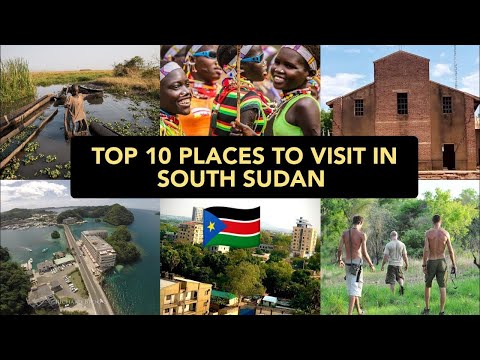
South Sudan, the world’s youngest country, declared independence in 2011. While it has faced significant challenges since its formation, the country also boasts a wealth of natural beauty and cultural richness waiting to be explored by intrepid travelers. From vast wetlands to bustling cultural festivals, South Sudan offers a range of experiences that highlight both the resilience and the vibrancy of its people and landscapes. Here are the top 10 must-visit destinations in South Sudan that should be on every traveler’s list.
1. **Juba**
As the capital city, Juba serves as the gateway to South Sudan. The city is located along the White Nile and offers a mix of urban life with markets, restaurants, and lively bars. Visit the John Garang Memorial Park for a touch of history or enjoy local cuisine at one of many eateries along Tong Ping Road.
2. **Boma National Park**
One of Africa’s largest wildlife reserves, Boma National Park covers approximately 22,800 square kilometers and is known for its annual animal migration, which rivals that of Kenya and Tanzania. Visitors can witness vast herds of white-eared kob, tiang antelope (a subspecies of Mongalla gazelle), and elephants trekking across the plains.
3. **Nimule National Park**
Located on the border with Uganda, Nimule National Park is one of South Sudan’s most accessible parks from Juba. The park features stunning landscapes along with opportunities to see hippos, elephants, and various bird species by taking a boat trip on the Nile.
4. **Sudd Wetland**
The Sudd is one of the largest freshwater wetlands in the world. This sprawling aquatic landscape supports an incredible diversity of life and provides breathtaking views via small plane tours or by navigating through water channels in boats.
5. **Bandingilo National Park**
Often overshadowed by Boma but equally impressive, Bandingilo National Park sees another phenomenal migration involving over a million antelope moving through its territories annually.
6. **Wau**
A city with a colonial past visible in its architecture, Wau is set amidst rolling hills and vast grasslands. It’s an excellent base for exploring Western Bahr el Ghazal state’s cultural sites including local markets where traditional art crafts are sold.
7. **Malakal**
Once a bustling economic center before civil strife affected it severely, Malakal lies along River Nile’s banks offering visitors insights into Shilluk Kingdom’s rich history through visits to nearby temples and palaces.
8. **Raga**
Located in Lol State to the west near CAR borderlines; Raga stands out with its biodiversity including dense savannah forests harboring wildlife such as leopards and kobs while also showcasing distinctive Azande culture through community walks.
9. **Kapoeta**
A small town known for its vibrant Thursday market where ethnic groups like Toposa come together trading not just goods but also stories; Kapoeta is also noted for gold mining alongside traditional livelihoods like pastoralism.
10. **Tombura-Yambio**
This area gives you access to Zande culture with opportunities to explore their customs through dance performances or artisan crafts made from local materials – particularly wood carvings which are famous throughout South Sudan.
**Travel Considerations:**
When planning your trip to South Sudan, it’s critical to stay informed about travel advisories from reliable sources due to ongoing political instability in some parts of the country as well as logistical challenges posed by limited transportation infrastructure outside major urban centers.
Moreover applying for necessary travel permits should be done well in advance alongside malaria prophylaxis measures due high mosquito prevalence especially around wetland areas like Sudd.
**Conclusion:**
Exploring South Sudan provides an opportunity not just for adventure but also for gaining deep insights into human resilience amidst trials faced since achieving independence.
With careful planning your visit can contribute positively towards sustainable tourism efforts aimed at preserving this young nation’s unique heritage while fostering economic growth through respectful cultural exchanges between visitors & host communities alike.
